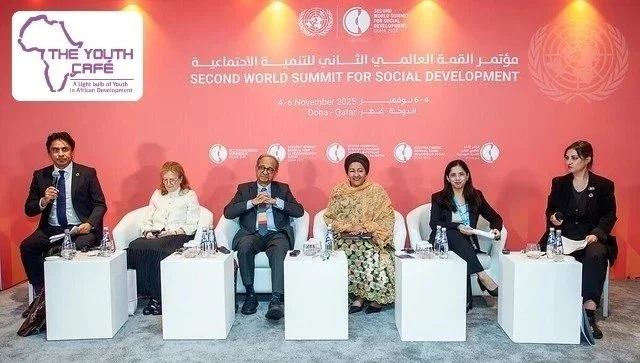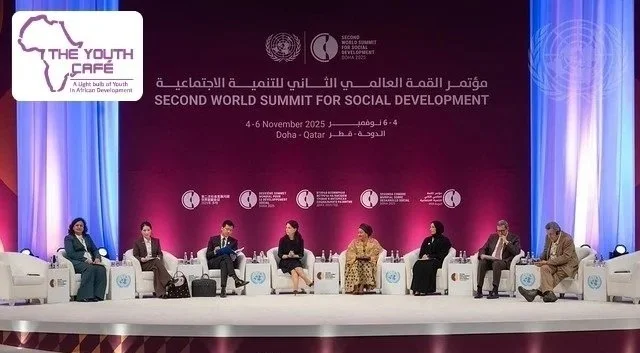#SocialSummit2025
About the Summit
The Second World Social Summit for Social Development in Doha, Qatar, from 4 to 6 November 2025, brings together Heads of State and Government, ministers, and delegates from around the globe.
Thirty years after the landmark 1995 Copenhagen Summit, the Summit will provide a unique opportunity to assess progress, address gaps, and renew global commitments to the three interrelated pillars of social development:
Poverty eradication
Full and productive employment and decent work for all
Social integration
The Summit will reaffirm the vision of placing people at the centre of development. It will give fresh momentum to the implementation of the Sustainable Development Goals by 2030, ensuring that no one is left behind.
The Summit aims to develop innovative solutions and foster consensus on bold, actionable policies that promote social justice, equality, and inclusion globally.
Objectives
The Second World Summit for Social Development has three overarching objectives:
Recommit to the Copenhagen Declaration and Programme of Action and give momentum to its realization by assessing progress and addressing gaps in social development.
Promote social development and social justice anchored in a strengthened and effective multilateral system.
Advance integrated, people-centred approaches and actions that enhance social development outcomes and accelerate social progress.
Impact and Urgency
Significant progress has been made over the past 30 years: poverty has declined, global unemployment has reached historic lows, and access to education, health, and social protection has expanded.
Yet, progress remains uneven and fragile, as highlighted in the ILO’s 2025 report The State of Social Justice: A Work in Progress:
Since 1995, nearly 1.5 billion people have escaped extreme poverty according to the World Bank’s Poverty and Inequality Platform (PIP). Yet, as of 2023, an estimated 808 million people still lived in extreme poverty. Beyond income, poverty also takes many other forms: in 2024, around 1.1 billion people faced multidimensional poverty, experiencing overlapping deprivations in health, education, and living standards.
Income inequality has risen in many countries since 1995, and gender wage gaps remain significant. Women still earn only 78 per cent of men’s earnings on average, with the gender wage gap projected to take 50–100 years to close.
Working poverty fell from 27.9 per cent in 2000 to 6.9 per cent in 2024, yet significant disparities persist.
The high rate of youth not in education, employment, or training (NEET) continues to be a challenge, especially young women (28 per cent in 2024).
Over half of the world’s population is now covered by at least one social protection scheme, but gaps remain wide in low-income countries.
Informal employment affects 58 percent of workers globally, limiting access to decent work.
Persons with disabilities, older persons, and other vulnerable groups remain excluded from full participation or exclusion in society due to various barriers, including physical, informational, and attitudinal obstacles, and discriminatory systems.
Climate change, conflicts, pandemics, and digital inequalities are undermining progress in social development.
The Second World Social Summit for Social Development will be a pivotal moment to galvanize solidarity, rebuild trust, and chart a renewed path forward for inclusive social development.
Key Areas
Building on the Doha Political Declaration, the Second World Summit for Social Development will advance commitments in key action areas:
Eradication of Poverty
Eradication of poverty in all its forms and dimensions remains the greatest global challenge. The Summit calls for comprehensive strategies to tackle the root causes of poverty and the underlying causes of inequality. Key priorities include expanding investments in social protection, ensuring access to food, water, housing, education, and health systems, with special attention to women, children, persons with disabilities and people in vulnerable situations. In addressing poverty eradication, the Summit seeks to strengthen international cooperation, mobilize sustainable financing, and promote inclusive policies, including child-sensitive and disability-inclusive approaches. It also highlights the importance of improved data systems, multidimensional poverty metrics, and the role of the social and solidarity economy.
Employment & Decent Work
The Summit will drive action to promote full and productive employment and decent work for all as a central driver of poverty eradication and sustainable development. This includes:
Transitioning from informal to formal economies
Tackling youth unemployment
Supporting entrepreneurship, small enterprises and cooperatives
Investing in skills for the green and digital transitions
Ensuring equal pay for equal work
Tackling child and forced labour.
Commitments also include policies for women’s economic empowerment, intergenerational knowledge transfer, and a renewed global commitment to deliver social justice and social development.
3. Social Integration
Building inclusive, just, and cohesive societies is at the heart of the Summit’s agenda. Commitments include:
Reducing inequalities,
Combating racism and discrimination
Acknowledging the role of families
Fostering intergenerational solidarity, and
Ensuring the participation of all, women, youth, older persons, persons with disabilities, Indigenous Peoples, and marginalized groups.
Investment in early childhood development, culture, sport, and volunteerism will strengthen social cohesion, while urgent action is pledged to address homelessness as a barrier to human rights.
Cross-cutting Priorities
The Summit recognizes the interlinked nature of today’s challenges and opportunities. Commitments cover:
Rebuilding trust in institutions through inclusive, accountable, and transparent governance.
Ensuring food security and nutrition, through resilient food systems, sustainable agriculture, and support to small-scale farmers.
Prioritizing high standards of physical and mental health, including by achieving universal health coverage, investments in resilient health systems, leveraging digital health technologies, and equitable access to medicines.
Promoting effective digital transformation by harnessing technology and AI for inclusive social development, while closing digital divides and safeguarding human rights.
Promoting, inclusive, equitable, quality education, including lifelong learning, as a foundation for social cohesion.
Building climate resilience and pursuing disaster risk reduction to protect lives and livelihoods and ensure just transitions.
Achieving gender equality and the empowerment of women and girls, including measures to redistribute unpaid care work, combat gender-based violence and ensure women’s meaningful participation in decision-making.
Combatting racism, racial discrimination, xenophobia, and related intolerance to achieve social development for all, based on human dignity, social justice, and social cohesion.
Ensuring adequate, safe, accessible and affordable housing, water, sanitation and hygiene.
Recognizing migration as a driver of inclusive development and ensuring safe and orderly pathways and protection of migrants’ rights.
Closing the gaps in financing sustainable development, including reforms to the international financial architecture, and mobilization of public and private resources.
A Call to Action
The Second World Social Summit for Social Development is a call to action.
It calls on world leaders and development practitioners to recognize social development as a cornerstone of peace, prosperity, and sustainability. The Doha Political Declaration, to be formally adopted by Member States at the Summit, is a collective pledge to reinvigorate multilateralism and accelerate social development, leaving no one behind.
By reaffirming our shared values and committing to bold, inclusive policies, we send a clear message: multilateralism is alive, and our collective will to build a fairer, more resilient world is stronger than ever. The Summit represents a pivotal moment to renew hope, deliver concrete action, and reaffirm our shared commitment to justice, equality, and dignity for all.



